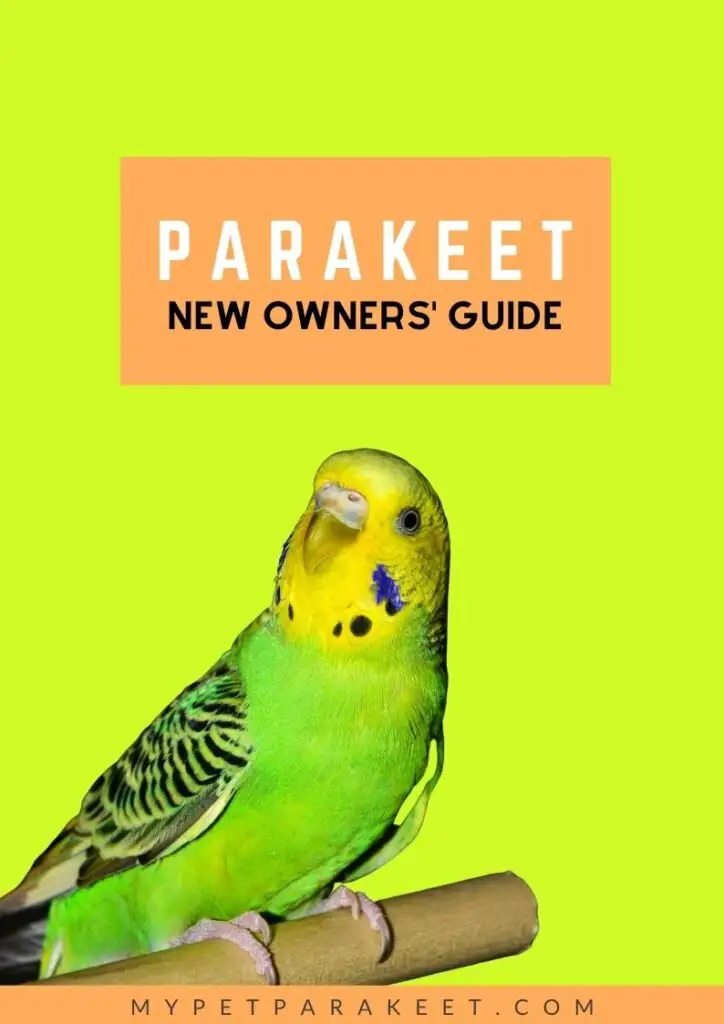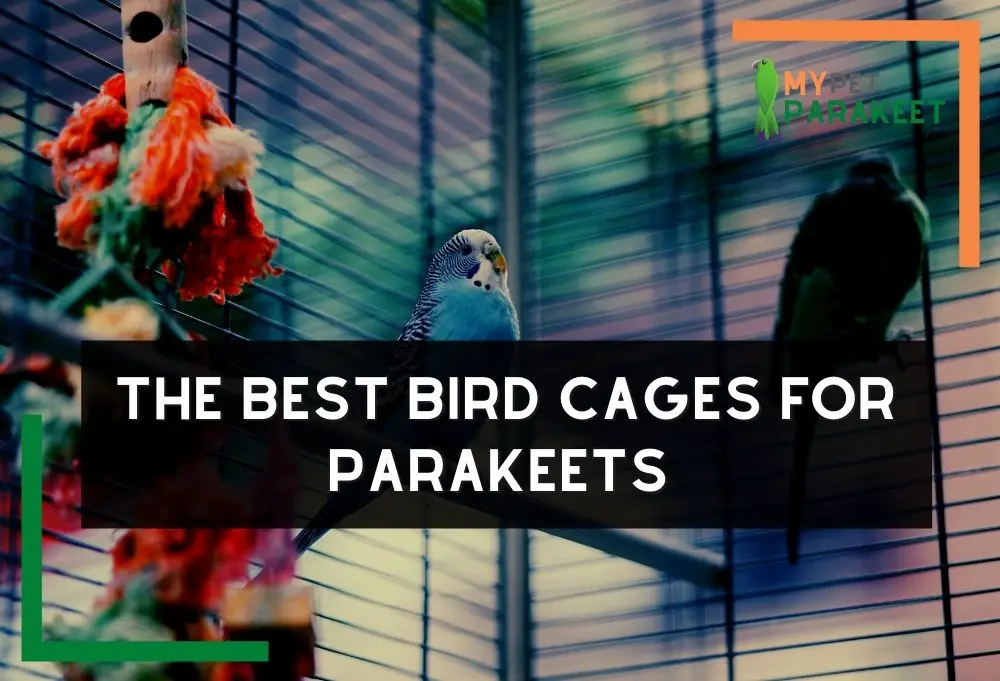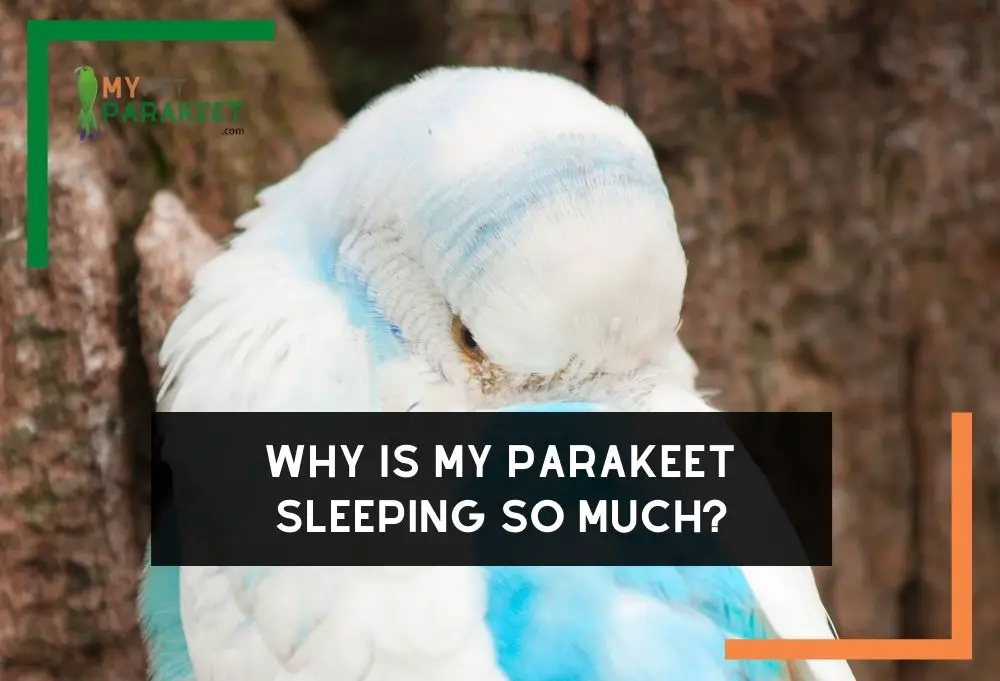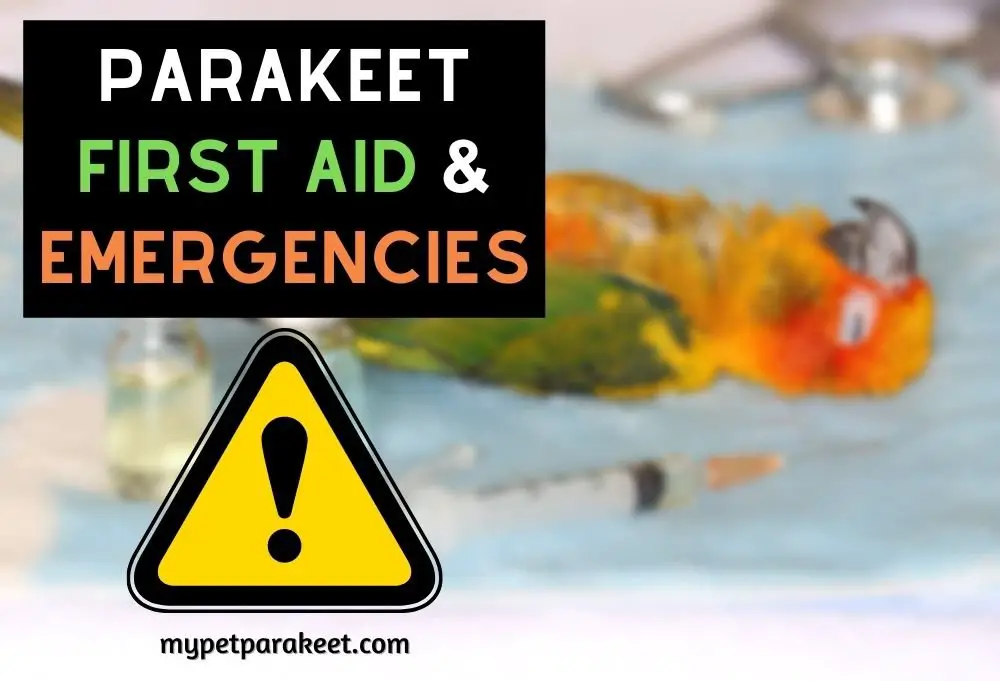“I recently lost my parakeet, Blossom. I loved her dearly and couldn't imagine life without her. She was a very social bird and would always greet me when I came home from work. She never got angry with me for not playing with her all day or leaving the cage door open too long. But she died suddenly! A lot of people told me that it's probably because I left her cage door open one time too many, but that can't be true!”
“I never expected to have to write this email… I had been so happy with my parakeet, and now he's gone. He died suddenly in his cage last night. My bird was always very healthy; he seemed fine the day before when I came home from work and spent time with him while he ate dinner, and we played a game of peek-a-boo together through the bars of his cage. What could be the reason?”
“In the past few days, I have noticed that my parakeet was acting differently. He had been sleeping a lot and not eating his usual healthy diet of fruits and vegetables. This morning when I woke up, I couldn't hear him. My heart sunk as I walked to his cage only to find him lying lifeless on the bottom of it.”
We receive emails like this a few times a week. The loss of your beloved parakeet will is very upsetting, and you want answers.
Sometimes there were no obvious signs, and the death seems sudden. Other times, they had been behaving differently for a few days to a week, and you have found them lifeless.
In this post, we will cover some of the most common causes of a parakeet's sudden death.
You can learn all about your parakeet and become an expert on caring for your bird by reading our parakeet care guide!

There are many potential causes of parakeet death, and any number of factors may be the cause, but it is important to understand that it was more than likely a natural cause.
Potential Causes of Death
Many potential causes of parakeet death include:
- Bacterial infection from being bitten by another bird or insect
- Being infected with a virus after contact with another bird / contagious disease
- Parasites
- Malnutrition or a bad diet
- Hunger strike (starvation)
- Lack of water and food for an extended period of time (dehydration/starvation)
- Diseases spread through exposure to water (infection)
- Infection
- Trauma
- Stress-related illness or aggression between cagemates (trauma)
- Hypothermia / Excessive cold temperatures (freezing)
- An injury that is causing the bird to bleed out internally
- Choking
- Parakeet loneliness
- Overfeeding
- High temperature or high humidity levels in the cage
- Inadequate ventilation.
- Genetics
- Underweight at birth
These are all very possible reasons for your parakeet's sudden death. So let's look further into them to see what symptoms you may have noticed which can help you to determine the cause. It will also provide you with insight if you have other birds or intend on keeping more in the future.
Bacterial infection from being bitten by another bird or insect
If a bird is bitten by another bird or insect, it can cause an infection which may lead to a death from either internal bleeding or being too weak to fly and preen.
Bacterial infections flare-up through picking up harmful bacteria. Birds often come into contact with bacteria that are found in their environment. If the cage is not cleaned regularly, this can lead to illness which could potentially be fatal for your bird if untreated.
Parasites
If your parakeet has parasites, he may experience loss of appetite, lethargy, and weight loss. Your bird may easily have been invaded by parasites if he was attacked by another bird or insect, if he was not kept in a clean environment, or if the water dish had been used before it was changed.
Parakeets are susceptible to external parasites such as mites and lice. Mites cause intense itching, which can lead to feather loss and skin lesions. These external parasites are also carriers of other diseases like typhoid fever.
Lice are usually transmitted through birds coming into contact with one another, so avoid letting more than one bird out at a time to prevent the spread of lice.
Parakeets can also become infested with mites and lice from the outside environment, such as carpeting, curtains, trees, etc. Their eggs are laid in cracks in woodwork or furniture where they hatch out onto the bird themselves causing them stress and discomfort.
How can I prevent this in the future? To prevent this from happening again, it is recommended that you clean the cage on a regular basis, change the water dish often, and keep your bird away from other birds. If you suspect your parakeet has lice or mites, take them to a specialist vet as soon as possible.
Malnutrition or a Bad Diet
Inadequate nutrition leads to malnutrition or vitamin deficiency. Many parakeets die due to malnutrition or vitamin deficiency. One potential cause of this is feeding your bird an improper diet, which can lead to digestive problems and malnutrition. When you feed your parakeet the wrong foods or toxic foods, he may become malnourished or develop a vitamin deficiency, causing him to die from complications caused by those two factors.
These conditions are also likely if you do not provide a proper nutritional balance with proteins, minerals, vitamins, and amino acids in their diet.
How can I prevent this in the future? To prevent sudden death by malnutrition, we recommend feeding your parakeet a balanced and healthy diet full of vitamins and minerals it would receive from a natural diet. We recommend mixing their usual seed with this organic natural blend of grains and legumes for a fortified, nutritious meal. Also, avoid anything toxic to the parakeet – we have detailed all toxic foods in our expert parakeet owners guide.
Hunger strike
Yes, birds can go on a hunger strike!
If your parakeet was looking malnourished or started to exhibit strange behavior such as pacing, drooping wings, and was uninterested in food for several days, he may have been on a hunger strike; it may be the case that your parakeet died suddenly due to starvation.
How can I prevent this in the future? Parakeets have small bodies and fast metabolism, so they can't afford to be without food or water for long. In the future, if your bird is refusing to eat or drink, he may be trying to tell you that he's not happy.
You should consult a veterinarian as soon as possible if your bird is going on a hunger strike since this can lead to other health problems such as organ failure and death.
Disease
Your parakeet may have been suffering from a disease.
Diseases are the most common cause of sudden parakeet death. Viral diseases like psittacosis or coccidiosis are easily contracted by birds who spend time outside and are then brought inside. Birds can also catch viral diseases like psittacosis or bird flu from humans.
Respiratory problems, mouth rot, beak, and foot infections are some of the other symptoms that may indicate a parakeet is suffering from a disease.
How can I prevent this in the future? We have written all about diseases parakeets carry in this post. We explain how to prevent and what symptoms to look out for as well as the risks some may pose to humans.
Trauma
This could be as simple as hitting their head on something or another animal biting them. For example, if your parakeet was perched high up outside, he might have been attacked by a predator. While he may have survived the attack, the trauma to his body may have been too much, and he died from the impact.
How can I prevent this in the future? Accidents do happen and cannot always be prevented. Keeping your bird in a larger cage or restricting their designated flying area is an option if you are worried about predators.
Infection
There are many infections that may cause your parakeet to die, including beak and foot infections. These types of conditions can result from unclean water or food bowls.
How can I prevent this in the future? If you clean them properly, this risk is significantly reduced. An untreated infection could possibly have lead to your parakeet's death.
Stress-Related Illness or Aggression Between Cagemates
This falls in the category of trauma, also. Parakeets can become stressed or aggressive when they're caged together, and there's not enough space for them to fly.
Similarly, if your parakeet is living in an area where there are a lot of people coming by and making loud noises, it could be very stressful for them, and they might die suddenly due to being over-stimulated. The stress that they can endure in such instances is enough to cause death as their bodies become very weak, rendering them unable to fight off any diseases that might be present.
How can I prevent this in the future? If you suspect this was the case, in the future, make sure your parakeet has more room or let him be on his own.
Hypothermia (getting too cold).
Hypothermia could be the cause of your parakeet's death if he was exposed to a draft, such as an open window. If your bird died during the winter season and was living outdoors, he could have flown into the cold air where his body couldn't produce enough heat to survive.
How can I prevent this in the future? This would only happen if it's not warm outside, so make sure you are aware of this if you have outdoor birds who may be prone to fly off during the winter months.
An injury that is causing the bird to bleed out internally
Your parakeet may have had an injury that caused it to bleed out internally, caused by an accident or some other traumatic event.
How can I prevent this in the future? It is hard to look for symptoms of internal injuries, so there is not much you could have observed that would have prevented the death.
Choking
Parakeets have a small beak that is not very good at chewing, so if the bird swallowed a sharp object, it may cause an injury to the esophagus, which could lead to death. A parakeet can also choke on the grit in its cage or other debris.
How can I prevent this in the future? To prevent your parakeet from choking in the future, make sure you take care of your bird's nails and only give them food that is the right size for their beak.
Dehydration
A healthy parakeet will drink water and perch to maintain hydration, but as a pet owner, it can be hard to know whether or not your bird needs more fluids, so dehydration may happen on occasion.
How can I prevent this in the future? There are a few simple things you can do to ensure your parakeet does not die due to dehydration. Ensure he has a water dish that you have cleaned regularly, and place it where he will see it.
You can also provide him with fruits like strawberries or apples, which contain plenty of water to keep him hydrated. You can also buy a parakeet cage water dispenser, which will ensure it always has enough clean and fresh water.
If you notice any signs of dehydration, call your vet for advice on how to proceed.
Parakeet Loneliness
An elderly parakeet may die suddenly due to loneliness if they do not have company from a mate or friend at home.
How can I prevent this in the future? Get your parakeet a friend or mate! Most birds need companionship to live happily.
Overfeeding
Your parakeet may have died due to being overfed. You may not have even noticed you were overfeeding your bird.
How can I prevent this in the future? To prevent this, make sure you only feed your parakeet a small amount of food every day.
High Temperature, High Humidity Levels In The Cage or Inadequate ventilation.
If your parakeet's cage is not adequately ventilated, the temperature and humidity levels may have been too high. A parakeet's cage should be at a temperature of between 65 and 80 degrees Fahrenheit. If you notice the temperature of the cage was significantly higher than this, this could have been the cause of death.
How can I prevent this in the future? Ensure that your bird has a large enough cage with proper ventilation to avoid these issues.
Genetics
Birds in captivity are often inbred. In some cases, they are too inbred, which can cause genetic problems that will lead to death.
How can I prevent this in the future? You may be able to avoid this by shopping around at different pet stores and asking about their birds.
You can avoid breeders altogether and buy from a pet owner whose unrelated birds have mated. Inbreeding is also seen with some of the wild populations of these birds, so make sure you don't have any related pairs living together or within close proximity.
Parakeets should never be purchased from an aviary where sick birds are housed, as the chance of an infection spreading is too great.
It is important that your parakeets are active, have eyes that are bright and clean, and that they are fluttering or walking around in the cage. Except during their normal nap time, birds shouldn't just remain motionless in a corner. The store employee should hold the individual birds so you can carefully inspect them while they're being held.
Your Parakeet Was Underweight
If your bird was underweight at birth and has lost weight over time, it's likely that your pet has a medical condition. Parakeets often have some degree of beak malocclusion and will require periodic adjustments to their diet and feeding routine by a vet.
How can I prevent this in the future? Bring your bird to a vet to have them assess him periodically and move forward from there. Your vet will know the best course of action.
Old Age
Parakeets that are between five and eight years old can start to show signs of aging. Birds will often have a thinner body and lose some of their feathers which will eventually lead to a weakened immune system.
For example, if he was experiencing kidney failure before his death, this could have led to respiratory problems, which caused him to die suddenly as it would be difficult for him to breathe.
How can I prevent this in the future? Unfortunately, old-age gets us all… parakeets included.
Dealing With The Loss Of Your Parakeet
Although birds are long-lived pets, eventually we must say goodbye to them. Children may have more difficulty when it is time for this goodbye than adults do.
Helping Children Deal With Their Parakeets Death
To calm your child down after the loss of a pet, have him or her create a photo collage about the bird with pictures from magazines. Explain that these feelings will pass in time.
Regardless of your child’s age, it is important to be open about the loss of the parakeet in order to address and work through their feelings together.

Parents need to remember that, while helping the kids cope with their pet's death, they themselves may experience sadness. They should not feel like they have to say “They're only animals” or lessen their feelings of loss by saying “It’s just a parakeet.” Pets play important roles in our lives and families. When we lose people who are close to us, it is appropriate for them to also grieve.
Pet Loss Resources
If the death of your parakeet has severely affected you and you need help or support, please use the resources below. Everybody takes the loss of their parakeet differently but you are not alone.
| Organization | Contact |
|---|---|
| Pet Loss Phone Support | (855) 955-5683 |
| Chicago Veterinary Medical Association Pet Loss Support Helpline | (630) 325-1600 |
| Blue Cross Pet Bereavement Support Service | |
| ASPCA End of Life Care |
Conclusion
We have tried to cover the most likely scenarios and possible causes why your parakeet died suddenly, but it is important to remember that parakeets are living beings, and just like us, they will all die of old age at some point, and in some cases, it cannot be prevented.
How to help your parakeet live a longer life:
If you want to ensure your pet's death isn't as sudden as this article has mentioned, and give them the best chances at living the fullest life they can, there are a few things you can do:
– Keep an eye on your bird for any signs of change or symptoms mentioned above.
– Make sure their cage is cleaned often and that they have enough space to maneuver freely.
– Ensure they eat a well-balanced diet and get enough vitamins.
What to do if your parakeet dies suddenly:
– Contact an avian veterinarian for assistance.
– If you're not sure what caused the death, they may be able to help you find out.
– They can also provide a postmortem exam and histopathology report of tissue samples from organs and tissues in order to try to determine the cause of death.











